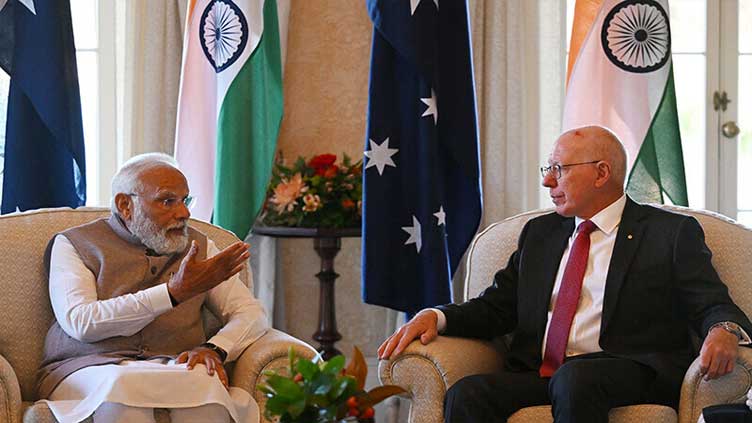Indian PM says 'separatist elements' must not hurt Australia ties

World
Indian PM says ‘separatist elements’ must not hurt Australia ties
(AFP) - Indian Prime Minister Narendra Modi warned Wednesday that “separatist elements” should not be allowed to hurt India-Australia relations, after he was lavished with a rockstar welcome in Sydney.
Lured by the world’s most populous market and the promise of a counterweight to a rising China, Australia has batted away questions about India’s treatment of opponents and minorities, suggesting they are domestic issues.
Modi appeared to have no such qualms.
The Indian leader hit out at recent “attacks” on Hindu temples in Australia — vandalism allegedly committed by Sikh separatists — after his summit with Prime Minister Anthony Albanese at Admiralty House on Sydney Harbour.
“We will not accept any elements that harm the friendly and warm ties between India and Australia by their actions or thoughts,” Modi told reporters, saying the pair had discussed “activities of separatist elements” in the past.
“Prime Minister Albanese has once again assured me today that he will take strict actions against such elements in the future,” Modi said according to an official translator.
Anti-Modi graffiti has this year been painted on a half-dozen temples in Australia, allegedly by those seeking the creation of a Sikh homeland known as Khalistan, in incidents widely reported by Indian media.
Protests by the Sikh diaspora erupted across the globe last month after a lengthy manhunt for a firebrand separatist that saw thousands of Indian police mobilised and mobile internet access cut for days across Sikh-majority Punjab state.
Albanese, who has previously condemned the graffiti incidents in Australia, made no mention of them in his remarks, instead hailing a new deal promoting the exchange of students, researchers, academics and business people with India.
The centre-left leader said he had joined “a rather extraordinary event” the previous evening, referring to Modi’s 12,000-strong, campaign-style rally at a Sydney arena.
‘Respectful’ relationship
“Prime Minister Modi is the boss!” Albanese had told the crowd of enthusiastic Modi supporters at the event, declaring the Indian leader a “dear friend”.
Albanese has given short shrift to questions about his support for Modi — a nationalist leader who faces re-election next year and has been criticised for sustained democratic backsliding and discrimination against India’s hundreds of millions of non-Hindus.
Asked if he was troubled by such accusations against Modi, Albanese told a radio interviewer: “Well, India is, of course, the world’s largest democracy.”
“Australia will always stand up for human rights, wherever it occurs anywhere in the world,” he added.
But asked if he planned to raise those issues with Modi, the Australian leader said he engaged with people on a “one-on-one” basis and would not be leaking details of his “respectful” relationship.
Rights groups say India’s 200 million Muslims have faced increased discrimination and violence since Modi and his Hindu nationalist BJP swept to power in 2014.
Under Modi, “the world’s largest democracy” has become much less free and more dangerous for his critics, according to Human Rights Watch’s Elaine Pearson.
But as Australia struggles with a more assertive China, it is looking for economic and political partners in an increasingly rough-and-tumble neighbourhood.
India’s economic performance has been mixed in the past decade, with missteps curbing growth. But hundreds of millions of people have been lifted out of poverty.
It is now the second-fastest growing economy in the G20 and a multi-trillion-dollar market.
The Indian-Australian community is the second-largest in Australia after Britain, with 673,000 Indian-born citizens in a population of 26 million.
Almost 90,000 Indian students are enrolled at Australian universities, the largest overseas contingent after China.

